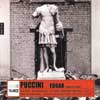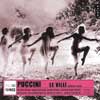Puccini Edgar
Singing and conducting which reflect the freshness of the young Puccini’s inspiration
View record and artist detailsRecord and Artist Details
Composer or Director: Giacomo Puccini
Genre:
Opera
Label: Astrée Naïve
Magazine Review Date: 11/2003
Media Format: CD or Download
Media Runtime: 121
Mastering:
Stereo
DDD
Catalogue Number: V4957

Tracks:
| Composition | Artist Credit |
|---|---|
| Edgar |
Giacomo Puccini, Composer
Carl Tanner, Edgar, Tenor Carlo Cigni, Gualtiero, Bass Dalibor Jenis, Frank, Baritone French National Orchestra Giacomo Puccini, Composer Julia Varady, Fidelia, Soprano Maîtrise de Radio France Mary Ann McCormick, Tigrana, Mezzo soprano Radio France Chorus Yoel Levi, Conductor |
Composer or Director: Giacomo Puccini
Genre:
Opera
Label: Astrée Naïve
Magazine Review Date: 11/2003
Media Format: CD or Download
Media Runtime: 68
Mastering:
Stereo
DDD
Catalogue Number: V4958

Tracks:
| Composition | Artist Credit |
|---|---|
| (Le) Villi |
Giacomo Puccini, Composer
Aquiles Machado, Roberto, Tenor French Radio Philharmonic Orchestra Giacomo Puccini, Composer Ludovic Tézier, Guglielmo, Baritone Marco Guidarini, Conductor Melanie Diener, Anna, Soprano Radio France Chorus Sylvie David, Narrator |
Author: Edward Greenfield
Hearing Edgar and Le Villi one after the other has, however, prompted an unexpected reaction. Though Edgar, the later of the two, produced after five years of struggle, brings greater technical sophistication, it is Le Villi, written when the composer was only 24, which is more characteristic of the Puccini we know; melodies are more memorable, with each clearly signalled as a high point, just as the big arias are launched in the later operas.
Part of the trouble may be that the still developing Puccini wanted to write a through-composed opera, one which spurns conventional arias and ensembles: salient solos tend to be cut off while you are expecting more. Yet the main problem is the libretto; its improbabilities were no doubt why Puccini’s unique gift of melody did not blossom quite as freely in Edgar as it had in Le Villi. Throughout his career, he needed total conviction in a subject before he could deliver his best, or even anything at all.
It is hard to see how any composer could have made some of Edgar’s twists convincing. At the climax of Act 1, for no evident reason, Edgar burns down his house, and in Act 3, just as implausibly, he stages his own funeral, with a suit of armour in place of the body. Some commentators suggest these actions are symbolic, reflecting the state of Edgar’s subconscious. More likely, the librettist, Ferdinando Fontana, introduced them solely to allow spectacular stage effects. And while the faithful heroine, Fidelia, is a tenderly sympathetic character, her rival, Tigrana, as the name suggests, is a character of animal passion, modelled on Carmen. Evil through and through, she remains one-dimensional, making Edgar’s passion for her seem capricious.
Even so, there is much in Edgar’s music that is rich and enjoyable, and Yoel Levi’s sympathetic conducting brings that out. Consistently warmer than Eve Queler on Sony, he’s helped by a far more refined, more spacious and atmospheric, recording. Though Carlo Bergonzi is more characterful in the title-role than Carl Tanner on the new set, the close balance submerges any subtlety in his singing; Tanner is allowed a far wider dynamic and expressive range. Renata Scotto, similarly, is less impressive than she might be thanks to the closeness of the recording. She, too, is characterful and imaginative as Fidelia, but the voice, as recorded, is far less pure than that of Julia Varady, who sings with astonishing freshness, producing exquisitely shaded top notes down to the most delicate pianissimi.
Mary Ann McCormick as Tigrana is well-contrasted with Varady, and her firm, clear mezzo is finely controlled. Clean singing, too, from Dalibor Jenis as Frank and Carlo Cigni as Gualtiero, with excellent choral work from the Choir of Radio France, whose choirmaster is the great Norbert Balatsch.
If the complications of Edgar detract from its impact, Le Villi might almost suffer from the opposite problem, when the story – very similar to that of Adam’s ballet, Giselle, with the Willies (Le Villi) destroying the faithless lover, Roberto – is so severely telescoped. After Act 1, when Roberto leaves swearing loyalty to Anna, a narrator has to be introduced, to explain first that Roberto has been led astray and then that Anna has died of a broken heart. Where the Sony set has Tito Gobbi as narrator, the new one has Sylvie David, lighter and more conversational. The telescoping of the story also involves two striking interludes, The Abandonment (with chorus) and The Witches’ Sabbath, a superb showpiece, which Pappano also recorded as fill-ups for his set of La Rondine.
Marco Guidarini proves just as convincing a Puccinian as Levi, bringing out the dramatic bite of such passages as these, as well as moulding the big melodies affectionately. The Sony set has Lorin Maazel conducting, but he is not helped by the closeness of the Sony sound, which at times makes him sound too aggressive. Equally Renata Scotto is not flattered by the closeness, and though, as in Edgar, both she and Plácido Domingo as Roberto are more characterful than Melanie Diener and Aquiles Machado on the new disc, the refinement of sound helps to make the fresh, sensitive singing of the newcomers just as enjoyable. Equally Ludovic Tezier is clear and direct as Anna’s father Guglielmo. Though no doubt other companies will one day wake up to the dearth of recordings of these two operas (what might Pappano reveal?) these latest offerings are very welcome indeed.
Discover the world's largest classical music catalogue with Presto Music.

Gramophone Digital Club
- Digital Edition
- Digital Archive
- Reviews Database
- Full website access
From £8.75 / month
Subscribe
Gramophone Full Club
- Print Edition
- Digital Edition
- Digital Archive
- Reviews Database
- Full website access
From £11.00 / month
Subscribe
If you are a library, university or other organisation that would be interested in an institutional subscription to Gramophone please click here for further information.




